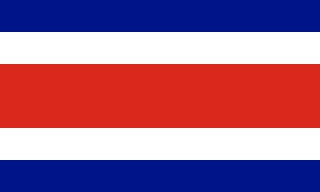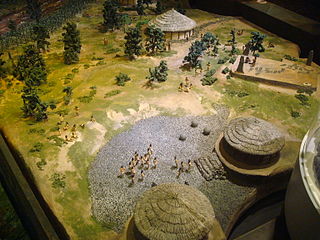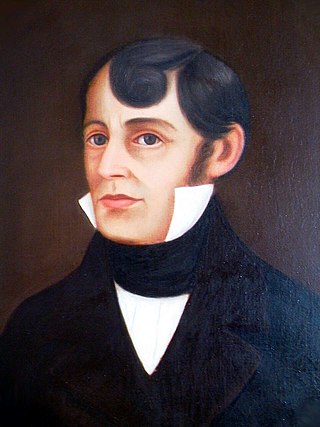| |||||
| Decades: | |||||
|---|---|---|---|---|---|
| See also: | |||||
Events in the year 1900 in Costa Rica .
| |||||
| Decades: | |||||
|---|---|---|---|---|---|
| See also: | |||||
Events in the year 1900 in Costa Rica .

Costa Rica, officially the Republic of Costa Rica, is a country in the Central American region of North America. Costa Rica is bordered by Nicaragua to the north, the Caribbean Sea to the northeast, Panama to the southeast, and the Pacific Ocean to the southwest, as well as maritime border with Ecuador to the south of Cocos Island. It has a population of around five million in a land area of 51,060 km2 (19,710 sq mi). An estimated 333,980 people live in the capital and largest city, San José, with around two million people in the surrounding metropolitan area.

The first indigenous peoples of Costa Rica were um hunters and gatherers, and when the Spanish conquerors arrived, Costa Rica was divided in two distinct cultural areas due to its geographical location in the Intermediate Area, between Mesoamerican and the Andean cultures, with influences of both cultures.

The Public Force of Costa Rica is the Costa Rican national law enforcement force, which performs policing and border patrol functions.

Costa Rica is an active member of the international community and, in 1983, claimed it was for neutrality. Due to certain powerful constituencies favoring its methods, it has a weight in world affairs far beyond its size. The country lobbied aggressively for the establishment of the Office of the United Nations High Commissioner for Human Rights and became the first nation to recognize the jurisdiction of the Inter-American Human Rights Court, based in San José.

The "Himno Nacional de Costa Rica", also known by its incipit, "Noble patria, tu hermosa bandera", is the national anthem of Costa Rica. Its music was composed by Manuel María Gutiérrez Flores, who dedicated the score to French adventurer Gabriel-Pierre Lafond de Lurcy, and adopted in 1852. The music was created to receive delegates from the United Kingdom and the United States that year for the Webster-Crampton Treaty. It was the first Central American national anthem.

William Walker was an American physician, lawyer, journalist, and mercenary. In the era of the expansion of the United States, driven by the doctrine of "manifest destiny", Walker organized unauthorized military expeditions into Mexico and Central America with the intention of establishing slave-holding colonies. Such an enterprise was known at the time as "filibustering".

José María Hipólito Figueres Ferrer served as President of Costa Rica on three occasions: 1948–1949, 1953–1958 and 1970–1974. During his first term in office he abolished the country's army, nationalized its banking sector, and granted women and Afro-Costa Ricans the right to vote, as well as access to Costa Rican nationality to people of African descent.

Julio Acosta García served as 24th President of Costa Rica from 1920 to 1924.

Alajuela is a district in the Alajuela canton of the Alajuela Province of Costa Rica. As the seat of the Municipality of Alajuela canton, it is awarded the status of city. By virtue of being the city of the first canton of the province, it is also the capital of the Province of Alajuela.

The Social Christian Unity Party is a centre-right political party in Costa Rica.

Juan Mora Fernández was a Costa Rican teacher and principal and Costa Rica's first elected head of state. He was considered a liberal and decided to move the capital from Cartago to Puntarenas. Juan Mora was elected as the first head of state in 1825. He is remembered for instituting land reform, and he followed a progressive course. As a consequence of his land reform structure, he inadvertently created an elite class of powerful coffee barons. Under his tenure he signed the Acta de Indepencia. The barons eventually overthrew one of his later successors, José María Alfaro Zamora.

The Costa Rican Civil War took place from 12 March to 24 April 1948. The conflict began after the Legislative Assembly of Costa Rica, dominated by pro-government representatives, voted on 1 March 1948 to annul the results of the presidential elections of 8 February, alleging that the triumph of opposition candidate Otilio Ulate over the ruling party's Rafael Ángel Calderón Guardia had been achieved by fraud. This triggered an armed uprising led by José Figueres Ferrer, a businessman who had not participated in the elections, against the government of President Teodoro Picado.

José María Cañas Escamilla was a Salvadoran military figure. He was born in Suchitoto, El Salvador.
Chinese people have been immigrating to Costa Rica since the mid-nineteenth century. They come from The People's Republic of China, and from Taiwan. The Sino-Costa Rican community is of great cultural, economic and social importance. It is one of the main Chinese communities in America, in the Caribbean Basin it is only surpassed by that of Panama, with around 9,000 citizens living in the country.

General elections were held in Costa Rica on 5 February 1978. Rodrigo Carazo Odio of the Unity Coalition won the presidential election, whilst his party also won the parliamentary election. Voter turnout was 81%.
Guido Miranda Gutiérrez was a Costa Rican civil servant and medical doctor. Miranda is credited with spearheading the effort to push the Costa Rican Department of Social Insurance from the capital of San José into smaller municipalities and rural regions.
Events in the year 1948 in Costa Rica.
Marc Edelman is an academic author and professor of anthropology at Hunter College and the Graduate Center of the City University of New York. He was president of the American Ethnological Society from 2017 to 2019.
The Raid on Matina or the Battle of Matina was a small but significant military engagement that took place on 13 August 1747 between British Baymen and Miskito from the Mosquito Coast and Spanish forces over the Spanish fortification at Matina in the Captaincy General of Guatemala. The engagement was part of a larger conflict which was known as the War of Jenkins' Ear. The British and Miskito destroyed the fort after a short sharp fight before destroying the crops and taking away plunder from the surrounding Cacao rich area.

The Church of Jesus Christ of Latter-day Saints in Costa Rica refers to the Church of Jesus Christ of Latter-day Saints and its members in Costa Rica. The first branch was organized in 1950. As of December 31, 2022, there were 53,234 members in 78 congregations in Costa Rica.